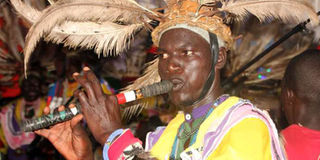Borrowing is what enriches our languages

A member of Ramogi Dancers plays a flute as they entertained guests during the Luo Tourism and Cultural Festival at Kenyatta Sports Ground in Kisumu on December 20, 2015. That is why I am so proudly Luo because only by drumming up pride in my roots can I contribute most solidly to the higher ideal called “Kenya”. PHOTO | TONNY OMONDI | NATION MEDIA GROUP
What you need to know:
- It is because of the shamelessness with which English has borrowed from practically every language in the world — including Kenya’s Kikuyu — that English is now the world’s richest and most powerful language in terms of vocabulary and idiom.
- For borrowing immediately makes available — at least as ideals — the experiences of the speakers of the language from which another is borrowing.
In his History of the Southern Luo, B. A. Ogot writes that, when they arrived in their present “...agriculturally fertile area ..., Joka Podho (the Luo) ... gradually became farmers...” cultivating “... sorghum (bel), eleusite (rau) and common vegetables such as beans (ng’or), lady’s finger (agwomo) … sesame (nyim) and groundnuts (amaido).”
Ogot, who taught me mathematics in high school but later dropped that subject for history, adds: “New crops such as maize (abitabo), sweet potatoes (rabuon) and cassava were introduced in the nineteenth and early twentieth centuries, but with little success...”.
In that statement, the keen reader will have noticed that the Luo word for maize was abitabo.
The question is then ineluctable.
How has that word completely disappeared from the lips of the Luo of Kenya and Tanzania?
I italicise those words because we, of Kenya’s Nyanza, should know that what Ogot calls “Joka Podho” are not the only Luo.
Moreover, nowadays, Luo is a culturo-linguistic concept tout court. It now has little to do with blood.
I know it because, although I am as Luo as Otieno Kwach, my blood contains thick drops from such great communities as Abaganda and Abasoga (Uganda), Abanyiera (Tanzania) and Abagusii and Abaluhya (Kenya), all of which — as indicated by the “aba” prefix of their names — belong to the “Older” and more authentic Bantu peoples.
That is why I am so proudly Luo — first, because I was born among and grew up as a Luo; but, secondly and much more importantly, because only by drumming up pride in my roots can I contribute most solidly to the higher ideal called “Kenya”, to which all members of this potentially great country purport to be fully committed.
As a concept, the term Luo refers to peoples who extend all the way from the most northerly parts of Southern Sudan – the Collo (pronounced cholo) — to a people of north-western Tanzania called Jokowak, and all the way from Kenya’s lacustrine region known as Nyanza to a people called Alur, who occupy a niche in the Congolese Republic’s north-eastern region.
LANGUAGE BORROWING
Yet the Luo of Kenya and Tanzania have completely lost their word abitabo in preference for oduma and bando, two words which have evolved, respectively, from entuma and ebando of the neighbouring Luhya (Bantu) people, a borrowing lubricated by the subsequently profuse intermarriage between the two communities.
Borrowing of this kind does not detract from, but is, indeed, what enriches a language.
It is because of the shamelessness with which English has borrowed from practically every language in the world — including Kenya’s Kikuyu — that English is now the world’s richest and most powerful language in terms of vocabulary and idiom.
For borrowing immediately makes available — at least as ideals — the experiences of the speakers of the language from which another is borrowing.
That is how Kenya’s ethnic communities have raised to high heaven all their existential ideals and other goals, ranging from something as real as skills (technology) to something as surreal as God (religion).





